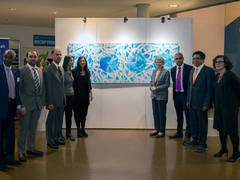UNESCO-Sharjah Prize for Arab Culture awarded to Bahia Shehab and eL Seed
The 14th edition of UNESCO-Sharjah Prize for Arab Culture was awarded, by UNESCO Director-General Irina Bokova, to two calligraffiti artists, Lebanese-Egyptian Bahia Shehab and Franco-Tunisian eL Seed, during an official ceremony that took place at UNESCO Headquarters in Paris on 18 April 2017.
In her speech, Irina Bokova emphasized the importance of renewing Arab culture as a force of dialogue and mutual understanding. The power of culture lies in its capacity to unite, dignify and elevate as it deepens the understanding of a shared history and present, and enriches society on the basis of mutual respect and cultivation of peace, all of which resonate in the spirit of the UNESCO-Sharjah Prize. She commended both laureates considering their works to be exemplary of the vitality of Arab culture, its richness and the link it establishes with other cultures by means of openness, creation and optimism.
Bahia Shehab expressed her gratitude to the Director-General, International Jury and organizers of the Prize, and the Sharjah authorities for their appreciation of her work. Receiving the award is very significant to her as she views herself as a global citizen belonging to a world beyond borders and notions of nations drawn by man. “To me these borders do not exist. To my mind the divide is no longer between us and them, between East and West or North and South, but rather a divide between those who are enlightened, compassionate, considerate, humble and kind, and those who are not.”, she said.
For Shehab the award comes as a testimony that culture can manifest itself in any form. The street is an essential social space for dialogue. It brings art closer to the people, “unlike museums, the streets are not exclusive,” she emphasized. Finally, Shehab called for more governments around the Arab world to recognize the importance of culture as an essential bridge between different civilizations and different ideologies. Hoping that more women will take initiatives to make their dreams concrete.
eL Seed on his part, spoke of his expedition through shedding light on how using calligraphy as an art medium has helped him embrace both his French and Tunisian identities, and travel beyond borders to connect with peoples and cultures. He elaborated that the message of embracing and learning from cultures is at the core of his artwork as an ambassador of culture and a citizen of the world.
H.E. Mr. Abdullah Al Owais, Chairman of the Department of Culture and Information of Sharjah, illustrated the cultural activities supported by the Sharjah Emirate. He indicated that it has been Sharjah’s mission to promote a vivid cultural landscape in many places around the world. On his part, H.E. Mr. Abdullah Alneaimi, Ambassador of the United Arab Emirates to UNESCO reiterated that the Prize embodies the approach and direction the Sharjah Emirate takes towards achieving moderation, tolerance and cultural advancement.
Hiam Abbass, President of the International Jury of the 14th edition, stated that this edition relished significant innovations by choosing two dynamic artists of whom one is a woman artist from the Arab region. She hopes that this will incite countries and organizations to submit more candidatures for deserving females for future editions. She also expressed her satisfaction that the Jury of the 14th edition decided to honor two artists in recognition of the role art plays in enriching and promoting Arab culture.
The event concluded with the two laureates presenting a calligraffiti painting that they prepared together for UNESCO.
***
Bahia Shehab (b. 1977) is an Egyptian artist, designer and art historian, whose work has been displayed in exhibitions, galleries and on the streets of cities in many parts of the world. As an engaged and committed calligraffiti artist, Bahia’s project, No, A Thousand Times No, is a series of graffiti images centered on the one thousand ways of writing “no” in Arabic. Her artistic work in graffiti brings to the forefront issues pertaining to political and economic injustices, as well as personal issues and gender-based violations, reflecting her conviction that art is a tool for change that can provoke people to leave their comfort zone and engage in action for justice.
eL Seed, was born in Paris to Tunisian parents in 1981 and learned to read and write Arabic in his late teens. He developed his unique pictorial style in calligraffiti that mixes poetry, calligraphy and graffiti and disseminates messages of peace and beauty perceptible even to those unable to decipher Arabic writing. eL Seed says that the beauty of calligraffiti is like music that can be appreciated independently of intellectual analysis. As an artist of Maghrebin background, he uses his artwork in public spaces to engage viewers in a dialogue that questions stereotypical narratives around Arab and Islamic culture in Europe.
Created in 1998 at the initiative of the United Arab Emirates, the UNESCO-Sharjah Prize for Arab Culture rewards the efforts of two personalities or organizations, one from an Arab country and one from any other country, who have made a significant contribution to the development, dissemination and promotion of Arab culture in the world. The Prize carries a monetary value of $60,000, equally divided between the two laureates.
<- Back to: Youth

